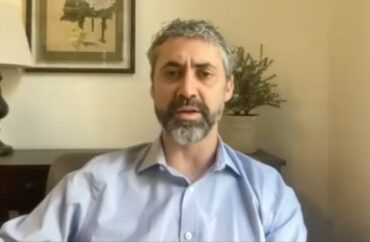
Cites mask skepticism as an idea therapists and patients are ‘afraid to express’
A clinical psychologist and professor founded a new organization aiming to provide therapy and research that does not discriminate based on political views.
Andrew Hartz, who sees patients privately and taught clinical psychology at Long Island University in Brooklyn, spoke with The College Fix by phone about his Open Therapy Institute.
“Like with a lot of other things, [in psychology] there’s kind of a clear orthodoxy that everyone is expected to follow,” Hartz (pictured) said. “It can leave out a lot of different perspectives and a lot of different types of people. This can impose political ideology on sessions or just push therapists to clash with patients who have different viewpoints.”
The Open Therapy Institute “strives to foster open inquiry in mental health care and support those overlooked in the face of politicization of the field,” its website states. It offers therapy, public and professional workshops, and research and helps connect patients to open-minded therapists.
“As therapy has become more politicized….more and more people feel stifled, including centrists, moderates, libertarians, and many liberals,” according to the site.
Dr. Hartz told The Fix that the self-censoring of viewpoints can rule out ideas that might promote better care.
For example, “there’s lots of reasons for psychologists to think that making everybody wear a mask might affect mental health,” he said. “People need to be able to see each other’s faces to regulate emotions and communicate.”
“So, there are concerns about that, but people are afraid to express them,” Hartz wrote. “If they express those concerns they may be seen as right-wing, and then they could face professional or social consequences. People who are concerned about a wide range of issues in the field are afraid to speak up and that really distorts the clinical literature.”
Even more, self-censorship can affect the mental health of patients directly, according to Hartz.
“Self censorship can be incredibly stressful,” he said. “It can lead people to experience anxiety, frustration, isolation, and feeling like they need to be fake. It undermines their connection with others and to the institutions they’re in.”
“There are a lot of people, whether they’re at a university or somewhere else, who are isolated or attacked for their views,” he said. “So, we really want to not just talk about these issues but actually provide support for people so that they can have a way to manage their situations and not just suffer alone and silently.”
Hartz told The Fix that ‘the number of therapists in the network is “large and growing,” though he could not provide an exact number.
Hartz also said that OTI is currently accepting new therapists with either California or PsyPact Licenses.
‘Social justice therapy is pernicious and harmful,’ senior advisor Sally Satel said
Sally Satel, a practicing psychiatrist and lecturer at Yale School of Medicine, serves as a senior advisor for OTI. Satel spoke to The Fix via email on January 7.
She wrote that her role as a senior advisor is to “help [Hartz] fulfill his dual mission of offering educational services to the public and to clinicians and to provide treatment for people who have been the victim of (or fear being the victim of) therapists who put their politics before their patients.”
“Social justice therapy is pernicious and harmful,” Satel said. “Its casualties need a group of people — OTI affiliates –who understand what they have been through and show them that therapy, done properly, can be a highly constructive experience.”
In 2021, Yale University psychiatry students complained in a letter that an online psychology lecture Satel gave on poverty and substance abuse in Ohio was “traumatizing” as well as “dehumanizing, demeaning, and classist,” as The Fix previously reported.
The Foundation for Individual Rights and Expression called the letter “another step in continuing retreat from academic freedom.”
Writing in Quillette, Satel described the pushback the students’ accusation that she “dehumanized” rural Ohioans with by voicing surprise at their enthusiasm for artisanal coffee.
MORE: Some colleges eliminate grading, cite students’ poor mental health
Editor’s note: This article has been updated to state that Satel is a psychiatrist, not a psychologist, and that Professor Hartz no longer teaches at Long Island University.
IMAGE: Open Therapy Institute/YouTube
Like The College Fix on Facebook / Follow us on Twitter





Please join the conversation about our stories on Facebook, Twitter, Instagram, Reddit, MeWe, Rumble, Gab, Minds and Gettr.